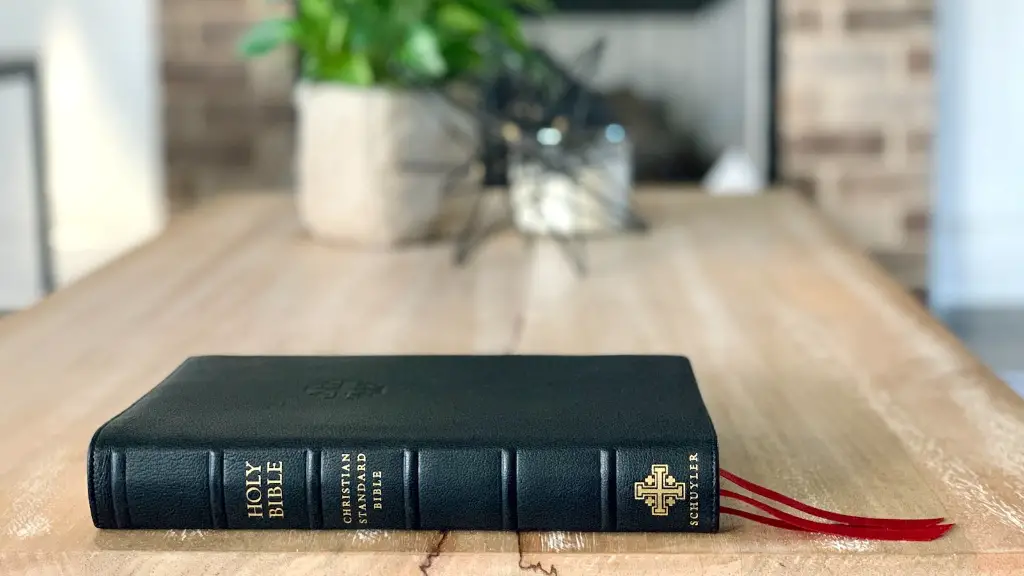Fear Not in the Bible: History and Meanings
Fear is a major part of human life, and not one that we easily dismiss. At times of trouble, when those around us give into fear, we reach out for help wherever we can find it. One such place that many look to is the Bible, for comfort, guidance, and sometimes an understanding of what it truly means to “fear not”.
The phrase “fear not” or “do not be afraid” appears in the Bible over 300 times, starting with Genesis 15:1 where God is telling Abram “do not be afraid.” This phrase is spread throughout both the Old and New Testaments, but does not appear the same way each time. Instead, it is a call for courage, for bravery, for strength in the face of adversity.
When it comes to what the phrase means, there are many interpretations. Theologians believe that it is a call to trust in God, to know that He is always with us and will protect us in times of need. Others take it as a call to action, to courageously stand up against wrongdoing. And still others believe that it is a call to stay present in difficult times, to be willing to confront fear and stay in the moment.
No matter how one chooses to interpret the phrase “fear not,” its presence in the Bible is undeniable. It is a powerful reminder that God is with us no matter what and that our faith can help us face danger bravely.
Religious Significance and Meaning
Religious people believe that the phrase “fear not” carries deep spiritual significance. For some, it is a reminder of God’s presence in their lives and a source of comfort during difficult times. For others, it is a call to action and a reminder to do the right thing, even when it is hard. For still others, it is a reminder to trust in God’s will and to remember that He will never leave them.
It is important to note that when authors write about the phrase “fear not” in the Bible, they often refer to it as “have faith” or “do not be afraid.” This is because fear and faith are closely linked together in Bible passages. One cannot exist without the other: Fear comes when one lacks faith, and faith is needed to conquer fear. This makes sense, as faith requires courage, strength, and trust. Thus, those who have faith can “fear not” even when things seem most challenging.
The phrase “fear not” is also seen as an admonition to stay sacred and have respect for the divine. To truly be a good and devout believer, it is important to have a healthy level of fear, not of punishment and judgment from God, but of the sacredness of one’s faith and of God’s power.
The Difference Between Fear and Anxiety
It is important to differentiate between fear and anxiety when discussing the phrase “fear not.” Fear is a natural and instinctive response to danger, while anxiety is an emotional response to fear. For example, if someone is standing in a dangerous situation, fear will be the initial reaction, while anxiety is the emotional response that they have after being in the situation.
Therefore, when looking at the phrase “fear not,” it is important to understand that it is often used to encourage people to overcome their fears, but also to address their anxieties as well. This is why many bible passages will urge people to “fear not,” emphasizing the importance of addressing one’s fears and worries in order to keep a healthy faith.
Psychology of fear
Fear is a primal emotion and is deeply entrenched in the human psyche. It is a response that is both mental and physical, and is something that people struggle to overcome because of the damage it can do to a person’s mental health. Fear can cause people to shut down and become unproductive, which can lead to further depression and anxiety.
The psychology of fear is complex and it is important to remember that it is something that must be faced and overcome in order to live a healthy and productive life. In this way, the phrase “fear not” is an excellent reminder to take on our fears and to trust in God and in ourselves.
Biblical Examples of Fear Not
The Bible contains countless examples of “fear not,” from Genesis to Revelation. These examples are instructive and provide guidance for how to address fear and anxiety in a faith-filled way. Some of the most commonly discussed examples of “fear not” in the Bible are:
• Isaiah 41:10 – “Do not fear, for I am with you; do not be dismayed, for I am your God. I will strengthen you and help you; I will uphold you with my righteous right hand.”
• Philippians 4:6 – “Do not be anxious about anything, but in every situation, by prayer and petition, with thanksgiving, present your requests to God.”
• Matthew 6:25 – “Therefore I tell you, do not worry about your life, what you will eat or drink; or about your body, what you will wear. Is not life more than food, and the body more than clothes?”
Non-Christian Interpretations of Fear Not
The phrase “fear not” is not just a Christian phrase. It has been used in many other religions and philosophies throughout history as well. Virtually every religion and spiritual practice has teachings that emphasize the importance of fear and how it should be confronted to foster growth, connection to the divine, and inner peace.
For example, the Buddha’s Eightfold Path teaches its followers to “fear not,” and Taoist teachings state that “fear not” is the key to living a balanced life. Ancient Greek philosophy further emphasizes the importance of fear and courage in the face of danger, as well as the importance of being in the present moment.
No matter the faith or spiritual practice, the phrase “fear not” is one that is echoed throughout. It is a reminder of our innate strength and courage and serves as an encouragement to confront our fears and anxieties.
Uses of Fear Not in Everyday Life
The phrase “fear not” is not only used in the Bible and other spiritual teachings, but also in everyday life. It is a powerful reminder that we can overcome our fears and anxieties and that there is hope, even in the most difficult of circumstances.
In everyday life, the phrase can be used to confront fear and to motivate oneself to take action. Whether it is a fear of the future, a fear of success, or a fear of failure, the phrase “fear not” can be used to give one the courage to confront their fears and take on life’s challenges with courage and strength. Additionally, “fear not” can be used to comfort someone in a time of need, reminding them that they are not alone in facing their fears.
Conclusion
The phrase “fear not” is one that is found in the Bible, as well as in many other spiritual texts. It is a reminder that we are not alone in our fears and can be a source of comfort and strength in difficult times. It is a call to courage, to trust in God and in ourselves. No matter our faith or spiritual practice, the phrase “fear not” serves as an important reminder that we all have the strength and courage to confront our fears, and that we are not alone in this endeavor.




